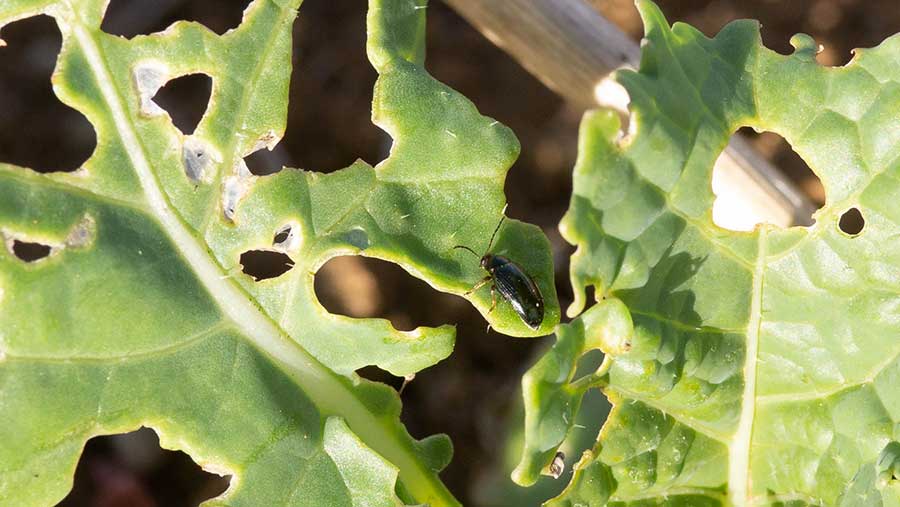OSR growers could lose 20% of crop due to flea beetle damage
 © Tim Scrivener
© Tim Scrivener Cabbage stem flea beetle has been wreaking havoc in emerging crops of winter oilseed rape, amid concerns that up to 20% of plantings could be lost.
Growers in eastern regions of England, including as far as East Anglia, are reporting high flea beetle pressure this season.
Jock Willmott, partner and agronomist at Ceres Rural, estimates up to 20% of OSR crops drilled in Bedfordshire, Buckinghamshire, Cambridgeshire and parts of Essex may have to be pulled up.
See also: Warm winters can cut rapeseed yields by 25%, research shows
“The oilseed rape that was drilled in middle to late August is struggling the most. The rain in the forecast never really came and we got caught out,” said Mr Willmott.
“People have rolled it tight, left stubbles long, drilled with companion crops, and used placed fertilisers and stimulants. But it is the tardy emergence and lack of moisture that’s the problem.”
Mr Willmott said it’s always the OSR crops that get off to the slowest start that seem to attract the most adult feeding pressure. The faster-emerging crops are far less affected.
“The adults appear to concentrate in the poorest fields,” he says. “Growing the crop remains a lottery.
“We have been surprised by the level of adult feeding pressure on emerging plants, as there was little indication the population of beetle would be bigger than last year until the bank holiday rains came. Logic follows that we will see a lot of egg-laying as we go into October in the crops with the worst adult feeding,” he added.
Mr Willmott says it’s important to be positive. Where crops are not good enough, the most positive action is to move on and plant something else, especially if blackgrass control is going to be an issue. “As the priority is drilling wheat, we will give it until mid-October before making a decision on some crops,” he added.
“If we do decide to rip it up, we will try to replace it with another break crop such as a pulse or sugar beet. For some the fields will go back into a winter cereal – each scenario is different.”
Crops ‘under attack’
Suffolk farm director Andrew Crossley has drilled 500ha of winter OSR this autumn at Thurlow Estate Farms, near Haverill.
“About 60% of it is up and away, and 40% is not as far forward as we would like it to be and it is taking some attack,” he said. “It should survive, but the jury is still out.”
Mr Crossley said he managed to drill the crop in the right conditions and the rain came shortly afterwards to help plants emerge. But other growers have not been as fortunate.
Fellow Suffolk grower Edward Vipond said he has not grown oilseed rape for three years, as it was “too risky”.
Mr Vipond is farm manager of the 1,400ha Troston Farms, based in Stanton, and he was crowned Farmers Weekly Farmer of the Year in 2021.
“Nothing has changed in the armoury. There is an element of luck to growing oilseed rape,” he said.
